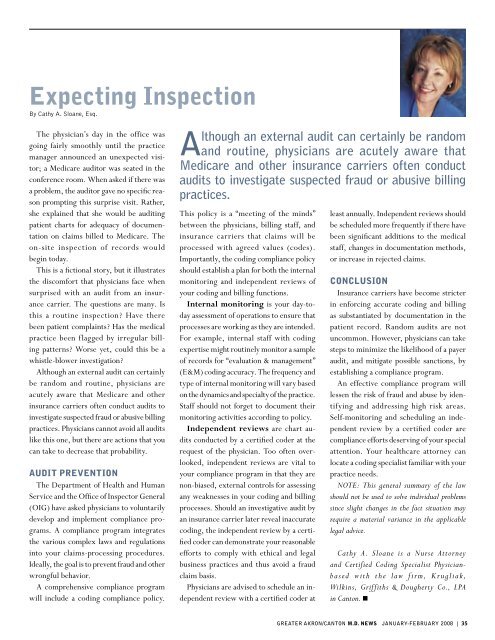Lisa Kohler, MD - AkronCantonMDNews
Lisa Kohler, MD - AkronCantonMDNews
Lisa Kohler, MD - AkronCantonMDNews
Create successful ePaper yourself
Turn your PDF publications into a flip-book with our unique Google optimized e-Paper software.
legal ease<br />
Expecting Inspection<br />
By Cathy A. Sloane, Esq.<br />
The physician’s day in the office was<br />
going fairly smoothly until the practice<br />
manager announced an unexpected visitor;<br />
a Medicare auditor was seated in the<br />
conference room. When asked if there was<br />
a problem, the auditor gave no specific reason<br />
prompting this surprise visit. Rather,<br />
she explained that she would be auditing<br />
patient charts for adequacy of documentation<br />
on claims billed to Medicare. The<br />
on-site inspection of records would<br />
begin today.<br />
This is a fictional story, but it illustrates<br />
the discomfort that physicians face when<br />
surprised with an audit from an insurance<br />
carrier. The questions are many. Is<br />
this a routine inspection? Have there<br />
been patient complaints? Has the medical<br />
practice been flagged by irregular billing<br />
patterns? Worse yet, could this be a<br />
whistle-blower investigation?<br />
Although an external audit can certainly<br />
be random and routine, physicians are<br />
acutely aware that Medicare and other<br />
insurance carriers often conduct audits to<br />
investigate suspected fraud or abusive billing<br />
practices. Physicians cannot avoid all audits<br />
like this one, but there are actions that you<br />
can take to decrease that probability.<br />
AUDIT PREVENTION<br />
The Department of Health and Human<br />
Service and the Office of Inspector General<br />
(OIG) have asked physicians to voluntarily<br />
develop and implement compliance programs.<br />
A compliance program integrates<br />
the various complex laws and regulations<br />
into your claims-processing procedures.<br />
Ideally, the goal is to prevent fraud and other<br />
wrongful behavior.<br />
A comprehensive compliance program<br />
will include a coding compliance policy.<br />
Although an external audit can certainly be random<br />
and routine, physicians are acutely aware that<br />
Medicare and other insurance carriers often conduct<br />
audits to investigate suspected fraud or abusive billing<br />
practices.<br />
This policy is a “meeting of the minds”<br />
between the physicians, billing staff, and<br />
insurance carriers that claims will be<br />
processed with agreed values (codes).<br />
Importantly, the coding compliance policy<br />
should establish a plan for both the internal<br />
monitoring and independent reviews of<br />
your coding and billing functions.<br />
Internal monitoring is your day-today<br />
assessment of operations to ensure that<br />
processes are working as they are intended.<br />
For example, internal staff with coding<br />
expertise might routinely monitor a sample<br />
of records for “evaluation & management”<br />
(E&M) coding accuracy. The frequency and<br />
type of internal monitoring will vary based<br />
on the dynamics and specialty of the practice.<br />
Staff should not forget to document their<br />
monitoring activities according to policy.<br />
Independent reviews are chart audits<br />
conducted by a certified coder at the<br />
request of the physician. Too often overlooked,<br />
independent reviews are vital to<br />
your compliance program in that they are<br />
non-biased, external controls for assessing<br />
any weaknesses in your coding and billing<br />
processes. Should an investigative audit by<br />
an insurance carrier later reveal inaccurate<br />
coding, the independent review by a certified<br />
coder can demonstrate your reasonable<br />
efforts to comply with ethical and legal<br />
business practices and thus avoid a fraud<br />
claim basis.<br />
Physicians are advised to schedule an independent<br />
review with a certified coder at<br />
least annually. Independent reviews should<br />
be scheduled more frequently if there have<br />
been significant additions to the medical<br />
staff, changes in documentation methods,<br />
or increase in rejected claims.<br />
CONCLUSION<br />
Insurance carriers have become stricter<br />
in enforcing accurate coding and billing<br />
as substantiated by documentation in the<br />
patient record. Random audits are not<br />
uncommon. However, physicians can take<br />
steps to minimize the likelihood of a payer<br />
audit, and mitigate possible sanctions, by<br />
establishing a compliance program.<br />
An effective compliance program will<br />
lessen the risk of fraud and abuse by identifying<br />
and addressing high risk areas.<br />
Self-monitoring and scheduling an independent<br />
review by a certified coder are<br />
compliance efforts deserving of your special<br />
attention. Your healthcare attorney can<br />
locate a coding specialist familiar with your<br />
practice needs.<br />
NOTE: This general summary of the law<br />
should not be used to solve individual problems<br />
since slight changes in the fact situation may<br />
require a material variance in the applicable<br />
legal advice.<br />
Cathy A. Sloane is a Nurse Attorney<br />
and Certified Coding Specialist Physicianbased<br />
with the law firm, K rugliak,<br />
Wilkins, Griffiths & Dougherty Co., LPA<br />
in Canton. ■<br />
GREATER AKRON/CANTON M.D. NEWS JANUARY-FEBRUARY 2008 | 35









